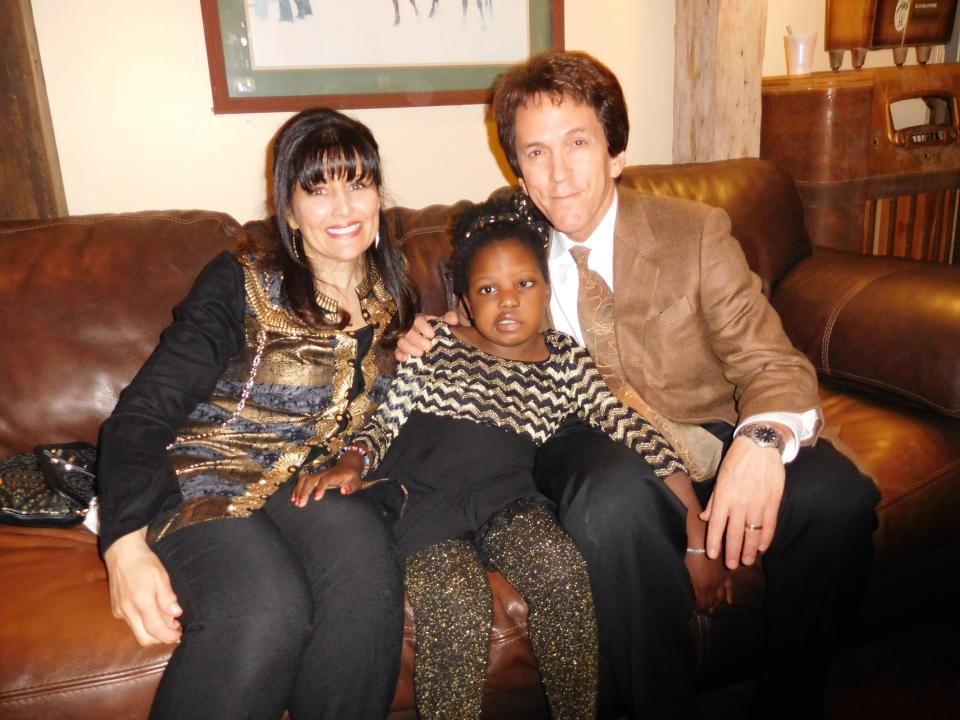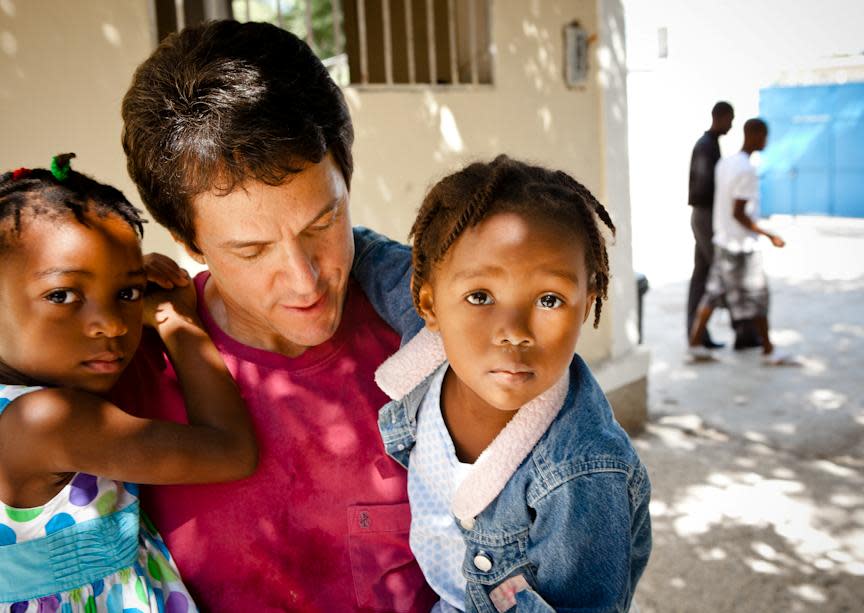'Cherish the time you have': 'Tuesdays With Morrie' author Mitch Albom coming to Polk

LAKELAND — Best-selling author and Detroit Free Press sports columnist Mitch Albom, 63, stumbled into becoming an expert on death and dying — and also on living life to its greatest potential — when he began a series of visits with his favorite Brandeis University professor, Morrie Schwartz, in 1995 as the man was dying from amyotrophic lateral sclerosis, also known as Lou Gehrig’s disease.
So who better to speak at The Chapters Health Foundation and The Hospice Women of Giving’s seventh annual Seasons of Service Luncheon on May 12th at the Lake Mirror Auditorium? The luncheon benefits Good Shepherd Hospice.
“We are so thrilled to have Mitch join us this year,” explains Hospice Women of Giving founding member Cindy Sternlicht. “Mitch has a way of helping you see loss and heartache through a lens of gratitude and hope, sprinkled with a little bit of humor. I am confident his words will have a lasting impact for our guests.”
More Polk County news:
Audit turns up 72 issues, including teachers without certifications
Polk book review panels approve 3 books on LGBTQ topics for school libraries
Polk County Public Schools considers high school grades at McLaughlin Middle
Albom, 63, chatted with The Ledger on Wednesday afternoon, squeezing in an interview among his book writing, reporting for his sports column and handling the duties as CEO of the multiple charities he and his wife, Janine, founded after the success of “Tuesdays With Morrie” in 1997. He has since written nearly a dozen other books, including “The Five People You Meet in Heaven,” “For One More Day,” and his latest, “The Stranger in the Lifeboat,” about a group of people who encounter God as they struggle to survive. He has also written several sports books.
“I think all of us are getting divine guidance, we just don't realize it,” Albom said when asked if he had ever had experienced that. “This latest book that I wrote, 'The Stranger in the Lifeboat,' was about what happens when you call out for God and suddenly God appears in front of you and says, ‘OK, I'm here. You asked for help. Here I am. Do you even believe it? Would you even believe it?’”
Albom said the best example of this in his life was how God placed a child in his and his wife’s path after they prayed for, but had no children of their own. The couple took over an orphanage in Haiti, where the children are housed, fed, taught and loved each day.
“When my wife and I got married, we got married kind of old, you know, we were close to 40 and we prayed to have children, but that didn't happen. And so we thought, well, maybe that's a prayer that is not going to be answered and we accepted that,” Albom said. “And then maybe 16 to 17 years later, we ended up with one of our kids from Haiti in our home. Her name was Chika and we basically adopted her when she had a brain tumor. And, suddenly, we had a 5-year-old in our lives, sleeping at the foot of our bed, waking us up for breakfast, giggling, laughing and playing and all the amazing things that children bring into your life.”

The Alboms took her to doctors and hospitals for treatments, but nothing more could be done. He said he has come to see that God answers prayers, sometimes just not the way we think they would or should be.
"Although she only lived for two (more) years, you know, I've come to realize that, in many ways, that may have been God answering our prayer from 17 years earlier," Albom said. "So I think my entire life and all the lives of the people that I know and care about have been touched by divine guidance. I'm just not maybe smart enough to understand it all just yet, but you know, as I get older, maybe I will.”
'How much richer would our lives be?'
Albom, who was already a well-known sports reporter and columnist in Detroit and often spent spring training in Lakeland covering the Tigers, was channel surfing one night in 1995 when he came across his former professor on "Nightline," being interview by Ted Koppel about his journey with ALS. Albom had promised to stay in touch with Schwartz, the man who was his greatest teacher in college and in life, but did not.
Albom picked up the phone and arranged to see Schwartz, which turned into an every-week "final class" for 14 Tuesdays until Schwartz’s death on Nov. 4. Albom refers to the book that resulted from those visits, “Tuesdays With Morrie,” as his thesis. Schwartz, he has written, taught him about the process of dying, but also about how to live.
"Morrie said to me the first time I visited him, just when I was leaving, he said, ‘Mitch, dying is only one thing to be unhappy about or sad about, living unhappily is another,’” Albom recalled. "You know, here you think, 'Oh, this is the worst thing that could be, what's right in front of me here. Somebody is dying.' But he didn't look at it that way. He looked at living unhappily, living unsatisfied lives, living lives just following the culture — you're living on Twitter and social media and living for movies and gossip and you know, kind of thin stuff like that. You know, you may be healthy, but are you really making the most of your days, you know, or people who don't like what they do, don't like where they are, don't like who they're living with, and yet they keep slogging away at it.”
Albom pointed out that when people realize they’re dying is when they try to make the most of every day. He urges people not to wait until they’re scared with a horrible diagnosis.
"How much richer would our lives be?”
Albom compared Schwartz’s death to an autumn leaf.
“It's like when a leaf dies, right before it dies, it's at its most colorful, and, in his case he was able to affect the most number of people,” Albom said. "So, there can be some positives that come out of our slow farewells.”
Albom peppered Schwartz’s advice throughout the book, including:
Above all, love – devote yourself to loving others. “Without love, we are birds with broken wings.”
Give to your community and be compassionate.
Create a life that gives you purpose and meaning, one that comes from your heart.
Find a way to make your dreams happen and stretch yourself into everything you can become.
Cherish and/or create a loving family – it is the foundation of your life.
Forgive yourself and others.
Be fully present with people, look them in the eye, talk with them, touch them.
Find someone to share your heart with, who shares your life values, cherishes your marriage and treats you with respect.
Create your own culture that aligns with your values.
Create your own community of kind, loving people.
Don’t chase after money or stuff.
If you need to, cry, but then concentrate on the good things in your life.
Delight in simple pleasures like singing, dancing and laughing.
Believe in the inherent good of people.
'I pray everyday'
Albom gets up at about 7 a.m. every day and goes to his office to write for several hours. But before he begins, he has a ritual of giving thanks.
“I pray everyday — I have a regular routine,” Albom said. "Before I write anything or read anything or turn on anything, I go through a set of prayers that, you know, they're private, but I could share that I pray for all the people who are in my world and my life and I start out by saying how grateful I am just to be awake and that everything is working and moving. Fingers are moving, toes are moving, I got downstairs. And because I travel to Haiti every month, I get a chance to see how life is in another place, so different than what we have here.”

Albom became involved in the Have Faith Haiti Mission and Orphanage following the devastating earthquake of 2010. Later that year, he took over operations and the name changed to Have Faith Haiti Mission. According to his website, the orphanage provides a safe, nurturing environment for Haitian children, who are cared for medically, nutritionally, educationally and spiritually. They are taught in both French and English, with a goal of achieving a college or vocational degree. Christian prayer and guidelines are a part of their daily life, as is a sense of giving back to the mission and their community through work and responsibility.
Albom said the children are not on the internet or watching television or texting on cellphones.
“I get to see from them what real childhood looks like without any of those things, and I can tell you that the children aren't cynical, they don't act smarter than their parents or the older people in their lives like they do in every sitcom that you see, they don't have to have short attention spans like we see with our kids now who just want to get to another screen,” Albom said. “When you don't inject all those things into their lives, kids are really patient, curious. They're not embarrassed as easily as they are when you start teaching them what to be embarrassed about. You know, we'll have 11- and 12-year-old boys who will walk with an adult and they'll just take their arm and put it around them, you know, because they like them and they don't think, ‘Oh, I'm too old for this and this isn't cool or I can't do that.’”
Albom said the children, who are living in the poorest country in the Western Hemisphere, teach him so much about the human spirit on his monthly trips to the island.
“They teach me about resilience, about gratitude, about faith,” Albom said. “All their possessions can fit into a single 12-inch-by-12-inch cubby, and yet they pray at night and say thank you, prayers of thank you to God as if they're the richest kids in the world. And they are eminently happy and upbeat and curious.”
'We just believe in respecting each other'
The Alboms will celebrate their 27th anniversary on Friday, but have been together for 34 years. The couple met when Albom went to hear Janine's sister play the piano — a passion he shares. Albom attended with the sisters' cousin.
"Janine showed up and and she saw me eating a Caesar salad — and my friend was her cousin — and he said, 'Oh, this is my cousin Janine,'" Albom recalled. "I said hi. And she looked at me, she said, 'Are you going to finish that salad?' And I said, 'No, no, you can have some.' And she sat down and we've been together ever since."
Albom said he doesn't know that he has a secret to a happy marriage, just that they share the same values and both understand the importance of the relationship.
"We just believe in respecting each other and laughing and, you know, we have a wall of photographs in our kitchen, of all the family members and things that we've done and places we've gone and all that," Albom said. "And sometimes we just look at that and recognize that, you know, there's three parties in a marriage — the husband, the wife and the marriage itself. And sometimes both of you have to love the marriage as much as you love each other and I think we've learned that."
Albom and officials with Good Shepherd share the same advice to the dying and their family members when their time comes — as it will with everyone.
"Number one, you want to cherish the time you have,” Albom said. “Number two, you want to use that time to say the things that maybe you haven't had a chance to say or some feelings that have gotten in the way from you saying them. Address the things that you really need to address and forgive everybody everything. Morrie said that to me and it's always resounded and I believe that that's true. You don't want to have grudges or things that weren't resolved, and then all of a sudden death takes one of the parties away and you never get them resolved.”
'It's all about the memories'
Sue James, 63, is Good Shepherd’s Hospice House manager at the facility on North Lakeland Hills Boulevard, although she likes to say she’s “the chick in charge.” She said she came to nursing 12 years ago and feels blessed to help people at this point in their lives.
“What hospice does, and what Good Shepherd is great about, is taking the fear out of dying and making it as peaceful and as comfortable” as possible, James said. "One of our goals, especially for our team, is to have a beautiful passing. What that looks like for me and what that looks like for you are two different things, but it's all a matter of meeting the people where they are and telling them it's OK, not to be afraid. We're not going to let you suffer. We're not going to do things that you don't want to have done. We're just here to help and we're here for support staff.”
Through Medicare, Hospice provides everything a patient needs, whether at home or in their facility or in a nursing home. Within a matter of hours of being admitted as a hospice patient, equipment is provided, including a bed, oxygen tank, potty chair, shower chair, walker, nebulizer and medication, along with round-the-clock certified nursing assistants, visits from nurses and doctors and a member of their faith community.
Good Shepherd’s average daily census for patients is about 600, with the average length of care at six months.
“We've had some people that last longer because their process is taking longer for them,” James said. “Just like when patients come into my Hospice House, our Hospice House, the average stay is five days. Do some people pass away faster? Yes. Do some people take longer to pass away? Yeah. This is all up to God and His timing.”
Good Shepherd nurses explain to family members what the process of dying is like. They make sure to provide any comfort the patient and family needs, including playing favorite music, allowing in beloved pets, and even having a final drink and visit with friends.
“It's all about the memories,” James said. “We have the opportunity to educate them … One thing that I love about Good Shepherd Hospice is that we give patients and families back the authority over their own life and their own death. It's their own journey and we are here for support staff. We answer questions and we talk about the taboo things. Death and dying is not exactly a glamorous topic to talk about, however, unfortunately, or fortunately, we all pass away. We all have our own death journey, but nobody talks about that.”
The fundraiser
The proceeds from Albom’s luncheon talk on Thursday will go to Good Shepherd to help care for more patients.
Although Schwartz told Albom that the journey doesn’t end there.
“As long as we can love each other, and remember the feeling of love we had, we can die without ever really going away," Schwartz said. "All the love you created is still there. All the memories are still there. You live on — in the hearts of everyone you have touched and nurtured while you were here.”
Admission to the lunch is $75 and includes a catered meal and a signed copy of Albom’s book. Seating is limited. Go to www.seasonsofservicetickets.com to purchase a ticket or call 863-559-2944 for more details.
Ledger reporter Kimberly C. Moore can be reached at kmoore@theledger.com or 863-802-7514. Follow her on Twitter at @KMooreTheLedger.
This article originally appeared on The Ledger: Mitch Albom, best-selling author, will help raise money for Polk hospice

